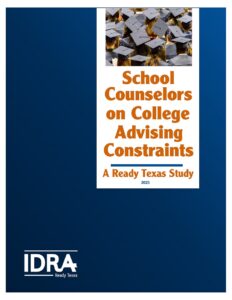IDRA Releases Study of the Role of Middle School Counselors in Supporting Students’ College Readiness
 (December 12, 2023) A decade after Texas policymakers weakened graduation requirements, middle school counselors struggle with their new role of college and career advising under the 2013 House Bill 5. IDRA today released a study, School Counselors on College Advising Constraints, about the impact of the law on their work and on students.
(December 12, 2023) A decade after Texas policymakers weakened graduation requirements, middle school counselors struggle with their new role of college and career advising under the 2013 House Bill 5. IDRA today released a study, School Counselors on College Advising Constraints, about the impact of the law on their work and on students.
The Texas Legislature ended the previous graduation requirements commonly known as the 4×4 that required Texas students to graduate with four courses each in math, English, social studies and science. Students are no longer required to take rigorous courses including Algebra 2 that prepare them for college. The policy also states that students must choose an “endorsement” – in essence, their future career path – in eighth grade.
Those changes put middle school counselors in a heightened role of advising young students to make long-term decisions about their educational careers.
 “In Texas, the counseling profession stands at a critical juncture in students’ lives,” said Hector Bojorquez, lead researcher for this study and IDRA’s director of operations and educational practice. “Counselors can directly influence how students see their future selves. Unfortunately, there are few policies or widespread practices to support middle school counselors in providing the best assistance to all students.”
“In Texas, the counseling profession stands at a critical juncture in students’ lives,” said Hector Bojorquez, lead researcher for this study and IDRA’s director of operations and educational practice. “Counselors can directly influence how students see their future selves. Unfortunately, there are few policies or widespread practices to support middle school counselors in providing the best assistance to all students.”
The majority of middle school counselors reported to IDRA that they spend at least 75% of their time performing tasks that have nothing to do with college and career counseling. Nearly all counselors interviewed were skeptical that eighth grade students are developmentally ready to choose a career path. Counselors are trying to support them with little to no resources. The American School Counselor Association recommends that schools have a counselor-to-student ratio of 1 to 250. In Texas, the average is 1 to 390.
The following recommendations to Texas policymakers reflect our analysis of counselor responses and relevant research:
- Address counseling time and funding so that middle school counselors can better serve students, including reducing counselor-to-teacher ratios;
- Address issues of equity to prepare middle school and high school counselors to support all students’ college readiness and to address racial-ethnic and socio-economic disparities;
- Provide counselors with data on college readiness, success and endorsement outcomes;
- Equip counselors to engage with families in navigating the system for students’ college preparation and access and with their community to leverage community resources and knowledge; and
- Prepare all students for college.
Greater Texas Foundation funded this study, which follows IDRA’s 2018 report, also funded by the foundation, that found rural school districts had a 24% drop in students taking Algebra 2.
Resources
Infographic: More Ready Texas with Middle School Counselors
Data dashboard: Math and Science Course Offerings in Texas
Infographic from IDRA’s earlier study showing rural districts lost 24% in Algebra II enrollment
Infographic: Math and College Readiness


